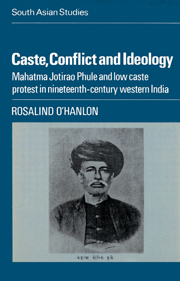 Caste, Conflict and Ideology
Caste, Conflict and Ideology Book contents
- Frontmatter
- Contents
- Acknowledgements
- Notes on translations and area under study, with map
- Part 1 Introduction
- Part 2 Religion and society under early British rule
- Part 3 Jotirao Phule and his circle: the emergence of a distinctive radical voice
- Part 4 The creation of a lower caste identity in history and popular culture, 1869–73
- Part 5 The lower caste community in contemporary society
- Part 6 Ideology and the non-Brahman movement in the 1880s
- 15 Phule's polemic in the 1880s: the ideological construction of rural life and labour
- 16 The non-Brahman movement in the 1880s
- 17 Epilogue: ideology and politics in nineteenth-century western India
- Bibliographic note
- Bibliography
- Glossary
- Index
17 - Epilogue: ideology and politics in nineteenth-century western India
from Part 6 - Ideology and the non-Brahman movement in the 1880s
Published online by Cambridge University Press: 14 October 2009
- Frontmatter
- Contents
- Acknowledgements
- Notes on translations and area under study, with map
- Part 1 Introduction
- Part 2 Religion and society under early British rule
- Part 3 Jotirao Phule and his circle: the emergence of a distinctive radical voice
- Part 4 The creation of a lower caste identity in history and popular culture, 1869–73
- Part 5 The lower caste community in contemporary society
- Part 6 Ideology and the non-Brahman movement in the 1880s
- 15 Phule's polemic in the 1880s: the ideological construction of rural life and labour
- 16 The non-Brahman movement in the 1880s
- 17 Epilogue: ideology and politics in nineteenth-century western India
- Bibliographic note
- Bibliography
- Glossary
- Index
Summary
By the time of his death in November 1890, Phule occupied a paradoxical position within the broader non-Brahman movement. On one hand, his labour had borne rich fruit in the creation of a broad popular movement around the ideas and symbols on which he had worked during the four decades since 1855. On the other, his uncompromising radicalism and his abrasive personal style seem to have left him rather isolated during the last years of his life. In 1889, he had suffered a stroke, which left him partly paralysed. As his health worsened, his friends became concerned that he and his wife would find themselves impoverished in their old age. In the absence of any other offers of support, the reformer Mama Paramanand appealed on behalf of Jotirao Phule and his family to Sayajirao Gayakavad, the Maharaja of Baroda. In his letter to Ramachandrarao Dhamnaskar, the Dewan of Baroda, and an active non-Brahman himself, Paramanand praised Phule's work:
His last and greatest service is connected with what he calls the emancipation of the Maratha mind. To this he devoted his later life, and for this he wrote, preached, sang and voted as he preached, and it is to his single exertions, I believe, that the Maratha element in the Deccan and elsewhere shows that consciousness of its wrongs, its desire for amelioration and freedom from implicit submission to the higher castes merely as such which did not exist before.
- Type
- Chapter
- Information
- Caste, Conflict and IdeologyMahatma Jotirao Phule and Low Caste Protest in Nineteenth-Century Western India, pp. 303 - 308Publisher: Cambridge University PressPrint publication year: 1985


